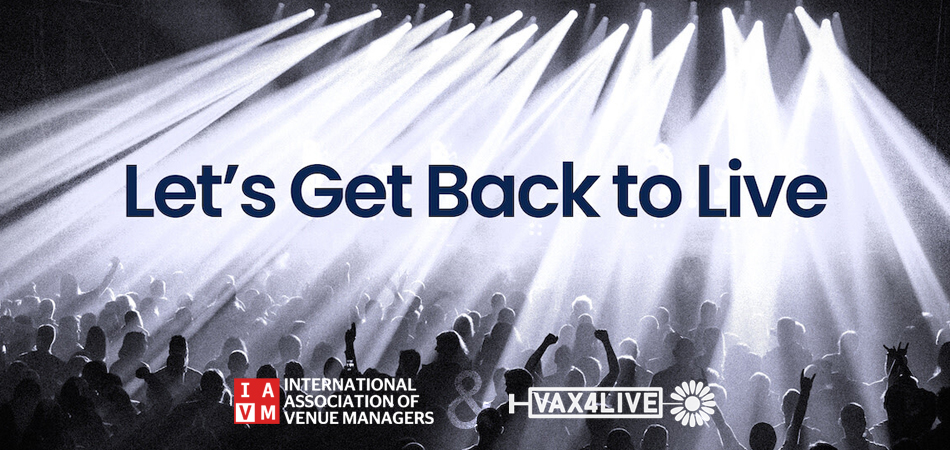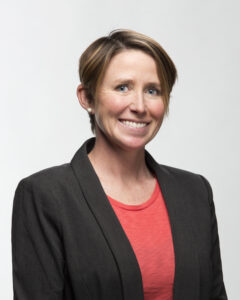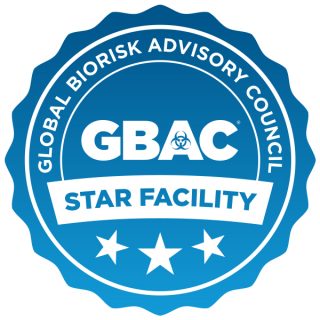IAVM Unites with Events Industry Coalition to Promote COVID Vaccination as Critical for the Safe Return of Live Events
 The International Association of Venue Mangers (IAVM) has joined forces with industry partners to encourage adoption of the COVID vaccine by launching a public awareness campaign titled ‘VAX4LIVE.’ The initiative is focused on raising awareness on the available vaccines as increased adoption is the quickest way to return to live events as safely as possible.
The International Association of Venue Mangers (IAVM) has joined forces with industry partners to encourage adoption of the COVID vaccine by launching a public awareness campaign titled ‘VAX4LIVE.’ The initiative is focused on raising awareness on the available vaccines as increased adoption is the quickest way to return to live events as safely as possible.
The live events industry has been shuttered for 13 months with devastating results for many artists and venues – economically and culturally. “Our industry has been hit hard by the pandemic,” stated Brad Mayne, CVE, IAVM President and CEO. “We were the first to have to close our doors, and will be the last to fully reopen. IAVM will do all we can to help raise awareness for COVID vaccines, and Vax4Live provides a central online location for information, engagement and enhances our efforts to advocate for and support the reopening of our industry.”
The National Independent Talent Organization (NITO) is leading the industry campaign along with several partners including Fox Theatre, AEG Presents, Bandit Lites, the International Association of Venue Managers (IAVM), the Independent Promoter Alliance (IPA), Red Light Management, Rock & Roll Hall of Fame, Universal Attractions Agency and others.
Due to the perceived uncertainty and misinformation of the effects of the vaccine, vaccine hesitancy exists in most states. Public acceptance and adoption, coupled with the distribution of science-based educational resources are crucial to increase vaccine participation. For information on COVID vaccine in your state, including vaccine locations, visit the CDC’s website here.
Additional vaccine resources from the CDC can be found:
- Key Things to Know About COVID Vaccines: https://www.cdc.gov/coronavirus/2019-ncov/vaccines/keythingstoknow.html;
- CDC Benefits of Getting a COVID Vaccine: https://www.cdc.gov/coronavirus/2019-ncov/vaccines/vaccine-benefits.html
- CDC Myths and Facts about COVID Vaccines: https://www.cdc.gov/coronavirus/2019-ncov/vaccines/facts.html
Shenyang EXPO’s Third Reopening Reflects Resilience of Exhibitions
By Maggie Yu
The Shenyang New World EXPO reopened on March 10th 2021 for its third time due to previous governmental mandated COVID related closures in January, April, and December of 2020. The activity following clearly indicated the resilience of the exhibition industry in Shenyang, Liaoning’s provincial capital city, as well as within the northeast region of China.
Five major events were held within EXPO in the last three weeks of March including the 2021 Shenyang  International Advertising Festival, the 2021 and 23rd North International Exhibition of Heating, Ventilation, Air Conditioning & Comfortable Home Systems, the 2021 and 22nd China Northeast International Dental Equipment & Affiliated Facilities Exhibition Symposium on Oral Health, the 2021 and 26th China Northeast International Building & Decoration Exhibition, and the Fang Guan Jia Real Estate Agency Annual Conference. The attendance for the five events totaled 187,952.
International Advertising Festival, the 2021 and 23rd North International Exhibition of Heating, Ventilation, Air Conditioning & Comfortable Home Systems, the 2021 and 22nd China Northeast International Dental Equipment & Affiliated Facilities Exhibition Symposium on Oral Health, the 2021 and 26th China Northeast International Building & Decoration Exhibition, and the Fang Guan Jia Real Estate Agency Annual Conference. The attendance for the five events totaled 187,952.
“From the reopening in July of 2020, all events have been successfully held; organizers have fully respected the COVID-19 procedures which have been approved by Shenyang’s health related bureau,” said Diane Chen, EXPO’s General Manager. “Plans put into action by EXPO included implementation of measures to minimize the causation of virus transmission, strict social distancing protocols, utilization of data and technology to support contact tracing and testing, and focus protocols and communications to reinforce behavioral change to address the new procedures. Attendees have been very cooperative with COVID procedures, e.g., wearing masks, body temperature checks, and distancing when queueing during entry. Visitors have been happy to sanitize their hands and most willing to show their personal health code before entering the venue. Through March 2021, no suspected COVID cases were reported. All the attendees are traceable using organizer registration systems and health codes”.
Shenyang’s health commission, commerce bureau, and public security bureau were included as an extremely important part of EXPO’s reopening team. All team members continually shared the most updated epidemic information and were available to respond to stakeholder questions regarding the status of the epidemic. Also used was the regular updates on operational advice from UFI, The Global Association of the Exhibition Industry and the International Association of Venue Managers. EXPO is an active member of both industry associations.
Cliff Wallace, CVE, Senior Executive Advisor to EXPO, noted that government bureaus were and continue to be very proactive in supporting the exhibition and conference industry and EXPO’s reopening. Wallace said, “On 24th February 2021, Ms. Wang Ping, the Deputy Director of Shenyang Center for Disease Control and Prevention and Mr. Lian Zhiyong, the Head of Emergency Office of the Municipal Center for Disease Control and Prevention, attended EXPO the 4th Organizer & Contractor Co-ordination Meeting encouraging all organizers to cooperate with EXPO’s COVID Prevention Procedures to facilitate the restart the exhibition industry. I was delighted to see the Commerce and Public Security Bureaus actively supporting the reopening by granting the event licenses expeditiously and on time considering the last minute decisions required of the organizers. A high level of cooperation by Government is critical in such emergency and crisis situations.”
Quarantine control measures remain in effect for visitors entering China from outside the mainland. This is similar to other countries globally. The exhibition industry remains challenged until international travel resumes. Both Chen and Wallace remain optimistic that the continual administration of the COVID vaccines and ability to verify that visitors have received the vaccine will be the most effective short term enhancement for the industry’s meaningful restart.
Maggie Yu is in Communications at the Shenyang New World EXPO.
Photo: The 22nd China Northeast International Dental Equipment & Affiliated Facilities Exhibition Symposium on Oral Health
Kelly Shea Joins VStar Entertainment as Senior Director of Booking
Kelly Shea will be joining VStar Entertainment as Senior Director of Booking on May 3, 2021. Kelly comes to VStar with over 20 years of experience in the live entertainment industry. She was most recently Executive Director of Strategic Partnerships and Business Development at Premier Sport Psychology in Minneapolis.
Premier’s client roster includes teams and athletes from the NBA, NHL, NFL and NCAA. Prior to that, she  spent two and half years at Ticketmaster working in their NBA and NHL segment in Client Development. Before coming to Ticketmaster, she spent almost 14 years at Feld Entertainment in the North American Routing and Tours Department, most recently as Senior Booking Director.
spent two and half years at Ticketmaster working in their NBA and NHL segment in Client Development. Before coming to Ticketmaster, she spent almost 14 years at Feld Entertainment in the North American Routing and Tours Department, most recently as Senior Booking Director.
Kelly started her career in live entertainment at VEE Corporation in 2000 first as a Promoter and then moved into Booking after two years. “I’m thrilled to join the team at VStar Entertainment Group, a leading worldwide entertainment company and producer of unforgettable live experiences,” she said. “I’m really excited to be working alongside Kevin Kulas, Vice President of the Cirque Du Soleil Affiliate Group, and to reconnect with all of my amazing industry friends and colleagues.”
NBA and NHL Arenas Score with GBAC STAR Facility Accreditation
By ISSA and R.V. Baugus
Professional sports venues continue to demonstrate their dedication to fans and players with GBAC STAR™ Facility Accreditation from the Global Biorisk Advisory Council™, (GBAC), a Division of ISSA. This week, the latest arenas to earn accreditation include FedExForum in Memphis, Tenn., home to the NBA’s Memphis Grizzlies; and Le Centre Bell (L’Aréna des Canadiens Inc.) in Montreal, home to the NHL’s Montreal Canadiens. GBAC STAR also accredited Utah State Fairpark in Salt Lake City; Providence Performing Arts Center in Providence, R.I.; and Houston Community College-Administration Building in Houston.
“By helping facilities prepare for, respond to, and recover from biorisks, GBAC STAR is raising the  standard for cleaning and disinfection,” said GBAC Executive Director Patricia Olinger. “Because it is a performance-based accreditation program, the public can trust the science behind the GBAC STAR seal that facilities display.”
standard for cleaning and disinfection,” said GBAC Executive Director Patricia Olinger. “Because it is a performance-based accreditation program, the public can trust the science behind the GBAC STAR seal that facilities display.”
In addition to continuing to gain ground with large stadiums and arenas, GBAC STAR is a sought-after program for convention centers and hotels that are eager to welcome visitors and guests as travel begins to pick up again. Designed for facilities of all types, the accreditation program requires participants to fulfill 20 key elements related to facility leadership, risk mitigation, standard operating procedures, and more.
This week’s newly accredited facilities include:
Arenas
FedExForum in Memphis, Tenn., home to the NBA’s Memphis Grizzlies
Le Centre Bell (L Arena des Canadiens Inc.) in Montreal, home to the NHL’s Montreal Canadiens
Convention Center and Expos
HIR Expos y Convenciones in Mexico City
Hot Springs Convention Center in Hot Springs National Park, Ark.
Italian Exhibition Group – Palacongressi di Rimini in Rimini, Italy
Italian Exhibition Group – Rimini Expo Centre in Rimini, Italy
Italian Exhibition Group – Vicenza Expo Centre in Vicenza, Italy
Kyoto International Conference Center in Kyoto, Japan
Pacifico Yokohama in Yokohama, Japan
Cultural Venue
Utah State Fairpark in Salt Lake City
Stadiums
Ford Center at the Star in Frisco, Texas, the practice facility for the NFL’s Dallas Cowboys
Red Bull Arena in Harrison, N.J., home to the MLS’s New York Red Bulls and the NWSL’s NJ/NY Gotham FC
Theaters and Performing Arts Centers
Benedum Center in Pittsburgh
Providence Performing Arts Center in Providence, R.I.
Adrienne Arsht Center for the Performing Arts in Miami
Byham Theater in Pittsburgh
“The cleanliness of a facility impacts the guest experience, just like service and price do,” said ISSA Executive Director John Barrett. “Proper cleaning must also incorporate disinfection and infection prevention techniques. With accreditation, people can be confident that facilities know how to uphold cleanliness to support health and safety.”
Learn more and apply for GBAC STAR Facility Accreditation at gbac.org/star.
Find accredited facilities and those pursuing accreditation via the GBAC STAR Facility Directory at gbac.org/directory.
IAVM members seeking to apply for accreditation through GBAC, please use the link https://gbac.issa.com/iavm/!
Brian Alessi Joins Henderson Engineers as Sustainability Director
Henderson Engineers, a national building systems design firm, named Brian Alessi, AIA, LEED AP, BD+C, as its new sustainability director. Alessi brings 20 years of experience in sustainable design to the role, including over 400 LEED certified projects, zero net energy projects, and residential and commercial passive house developments. He will be at the helm of Henderson’s long-running efforts to design buildings that are healthy, sustainable, and resilient. Alessi will also lead efforts to support Henderson’s sustainability-focused clients on their path to net zero.
“Brian is an invaluable addition to our technical leadership team as we continue to push ourselves to  expand our services to meet our climate goals,” said Dustin Schafer, chief technical officer at Henderson. “We’re committed to delivering work that is good for people and good for the planet. Brian is a longtime advocate of this approach. His holistic design process and multidisciplinary approach will help ensure we remain at the forefront of implementing innovative, cost-effective sustainability strategies for our clients.”
expand our services to meet our climate goals,” said Dustin Schafer, chief technical officer at Henderson. “We’re committed to delivering work that is good for people and good for the planet. Brian is a longtime advocate of this approach. His holistic design process and multidisciplinary approach will help ensure we remain at the forefront of implementing innovative, cost-effective sustainability strategies for our clients.”
Henderson’s design process aligns with standards set forth by the U.S. Green Building Council (USGBC) and each project is analyzed for its potential environmental impact, including CO2 emissions, landfill waste, and water and energy consumption. Henderson has more than 125 LEED-Accredited professionals on staff and the firm has completed more than 500 LEED projects, including the Golden 1 Center and practice facility in Sacramento, Calif., which was the first LEED Platinum and entirely solar-powered arena in the world.
“I collaborated with Henderson in the past as a consultant and appreciated how receptive the company is to adopting sustainable solutions,” Alessi said. “I believe sustainability is a beautiful blend of design, equity, and social good, and my role is to ensure the building systems we create nurture our environment now and for future generations. I’m excited to bring this vision and my expertise to the Henderson team.”
Do you want to receive a Front Row News weekly digest?
Categories
- Allied (856)
- Architecture (147)
- Arenas (744)
- Career (890)
- Convention Centers (889)
- Education (608)
- Events (1,528)
- Food & Beverage (193)
- Foundation (113)
- Guest Experience (1,482)
- Industry News (2,253)
- Leadership (1,872)
- Marketing (150)
- Membership (1,985)
- Music (212)
- Performing Arts Centers (453)
- Professional Development (398)
- Research (127)
- Safety & Security (425)
- Sports (763)
- Stadiums (607)
- Student (159)
- Technology (515)
- Ticketing (92)
- Touring (82)
- Trends (357)
- Uncategorized (771)
- Universities (216)
- Video (25)
- Young Professional (198)
Twitter Feed
- Twitter feed loading
Recent Posts
- GEODIS Park Selects Allied Universal As Its Preferred Event Services Provider
- Venuworks Appoints Marc Solis as Executive Director of the Fresno Convention and Entertainment Center
- Los Angeles Convention Center Diverts 8,000 Pounds of Wood Waste to Local Foundation Supporting Fire Victims
- Fort Worth Unveils Plans for Phase 2 of Convention Center Transformation
- San Diego Convention Center CEO Announces Retirement After a Decade of Leadership
Categories
- Allied
- Architecture
- Arenas
- Career
- Convention Centers
- Education
- Events
- Food & Beverage
- Foundation
- Guest Experience
- Industry News
- Leadership
- Marketing
- Membership
- Music
- Performing Arts Centers
- Professional Development
- Research
- Safety & Security
- Sports
- Stadiums
- Student
- Technology
- Ticketing
- Touring
- Trends
- Uncategorized
- Universities
- Video
- Young Professional
Archives
- February 2026
- January 2026
- December 2025
- November 2025
- October 2025
- September 2025
- August 2025
- July 2025
- June 2025
- May 2025
- April 2025
- March 2025
- February 2025
- January 2025
- December 2024
- November 2024
- October 2024
- September 2024
- August 2024
- July 2024
- June 2024
- May 2024
- April 2024
- March 2024
- February 2024
- January 2024
- December 2023
- November 2023
- October 2023
- September 2023
- August 2023
- July 2023
- June 2023
- May 2023
- April 2023
- March 2023
- February 2023
- January 2023
- December 2022
- November 2022
- October 2022
- September 2022
- August 2022
- July 2022
- June 2022
- May 2022
- April 2022
- March 2022
- February 2022
- January 2022
- December 2021
- November 2021
- October 2021
- September 2021
- August 2021
- July 2021
- June 2021
- May 2021
- April 2021
- March 2021
- February 2021
- January 2021
- December 2020
- November 2020
- October 2020
- September 2020
- August 2020
- July 2020
- June 2020
- May 2020
- April 2020
- March 2020
- February 2020
- January 2020
- December 2019
- November 2019
- October 2019
- September 2019
- August 2019
- July 2019
- June 2019
- May 2019
- April 2019
- March 2019
- February 2019
- January 2019
- December 2018
- November 2018
- October 2018
- September 2018
- August 2018
- July 2018
- June 2018
- May 2018
- April 2018
- March 2018
- February 2018
- January 2018
- December 2017
- November 2017
- October 2017
- September 2017
- August 2017
- July 2017
- June 2017
- May 2017
- April 2017
- March 2017
- February 2017
- January 2017
- December 2016
- November 2016
- October 2016
- September 2016
- August 2016
- July 2016
- June 2016
- May 2016
- April 2016
- March 2016
- February 2016
- January 2016
- December 2015
- November 2015
- October 2015
- September 2015
- August 2015
- July 2015
- June 2015
- May 2015
- April 2015
- March 2015
- February 2015
- January 2015
- December 2014
- November 2014
- October 2014
- September 2014
- August 2014
- July 2014
- June 2014
- May 2014
- April 2014
- March 2014
- February 2014
- January 2014
- December 2013
- November 2013
- October 2013
- September 2013
- August 2013
- July 2013
- June 2013
- May 2013
- April 2013
- March 2013
- February 2013
- January 2013
- May 2012
- March 2012
- December 2011
- November 2011
- October 2011
Recent Comments
- Frank Bradshaw, Ph.D., CVE on John Meyer, CVE, a Tireless Advocate of Certification for Venue Professionals, Has Died
- Neil Sulkes on Hilary Hartung, Friend to Many in Venue Marketing, Has Left Us
- Jason Parker, CVE on The Devastation of Hurricane Helene and How We Can Support One Another
- Larry Perkins on Touhey Testifies Against Speculative Ticketing Before Congressional Subcommittee
- Peter Secord on Major Players for Planned Elkhart Amphitheater Were in the Mix at VenueConnect
